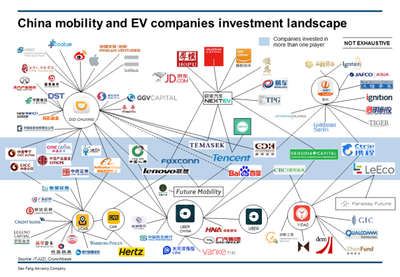Chinese Real Estate Developer Now Electric Vehicle Maker Announces Production Capacity
SEE ALSO TACH Green-vehicle Content Library
SEE ALSO: China Vows To Reduce Number Of EV Makers (9/13/2021)
SEE ALSO: Chinese Real Estate Developer Now Electric Vehicle Maker Announces Production Capacity
SEE ALSO: It's Batteries or Bicycles, China Has No Choice Other Then To Push EV's
SEE ALSO: Jan 3, 2022 - China Evergrande Group (3333.HK) shares have been suspended from trading on Monday pending the release of "inside information", the embattled property developer said without elaborating.
China's Evergrande Health aims to build production capacity for up to 1 million EVs in 3 years
Real estate developers' entry bodes well for China's EV ambitions
Commentary By Yang Jian | 2018/8/17
SHANGHAI 2018/8/17 -- Since last year, several major Chinese real estate developers have placed a bet on electric vehicles. They see synergies to be generated between EVs and their existing business, rather than short-term financial gains.
Their investments will help Chinese EV makers better cope with high capital expenditures and weather potential market risks.
Among the investments real estate development companies have made in EV makers, the one that has received the most extensive media coverage was carried out by China Evergrande Group, China’s second-largest property developer ranked by sales.
And the target company -- Faraday Future-- is an EV startup founded by founded by Chinese entrepreneur Jia Yueting in Los Angeles. Until two months ago, Faraday Future was teetering on the verge of bankruptcy from a severe cash crunch.
In June, Evergrande Group arranged for a subsidiary, Evergrande Health Industry Group, to acquire 45 percent of Faraday Future for 6.7 billion Hong Kong dollars (5.9 billion yuan).
This week, Evergrande Health, now Faraday Future’s largest shareholder, opened a new company, Evergrande FF Intelligent Automotive (China) Co., in the south China city of Guangzhou with registered capital of $2 billion (13.8 billion yuan).
Faraday Future started assembling its first vehicle, the FF 91 luxury crossover, at a leased plant in Hanford, Calif., this month. And Evergrande FF is expected to start producing the vehicle at a factory now under construction in Guangzhou in the near future.
Evergrande Group has deep pockets to tap when it comes to financing Faraday Future’s EV output. It generated a net profit of 52 billion yuan on revenue of 304.2 billion yuan in the first half.
With the powerful backing of its parent, Evergrande Health plans to build five assembly plants in China with combined annual production capacity of 5 million EVs for Faraday Future over the next 10 years.
By investing heavily in Faraday Future, Evergrande Group expects to establish a leading presence in the fast-growing domestic EV market. It also expects Faraday Future’s EVs to complement Everagrande Health’s premium hospitals and community health care centers across China.
In addition to Evergrande Group, two other major Chinese property developers have diversified with forays into the domestic EV industry.
China Fortune Land Development Co., China’s largest industrial park developer and operator, in December acquired a 53.4 percent interest in domestic EV startup Hozon New Energy Vehicle Co.
In the same month, Baoneng Investment Group Co., purchased a 51 percent stake in Qoros, a small Shanghai carmaker to accelerate Qoros' EV development and production.
In addition to real estate development, Baoneng, a private business conglomerate, also runs health care, insurance, auto components production and car financing businesses.
In October 2017, Country Garden Holdings, China’s largest real estate developer, disclosed plans to partner with domestic battery makers and other parts suppliers to build a large component factory for EVs in Shunde of South China’s Guangdong province.
In 2015, Beijing started reining in domestic real estate investments in a bid to cool the overheated housing market. In the past few months, the government has further tightened control on property development in China’s major cities.
The policy shift will send real estate developers in general searching for business opportunities in other sectors, and more of these companies likely will join Evergrande, Fortune Land Development and Baoneng to make their way into the EV industry in one way or another as strategic investors.



